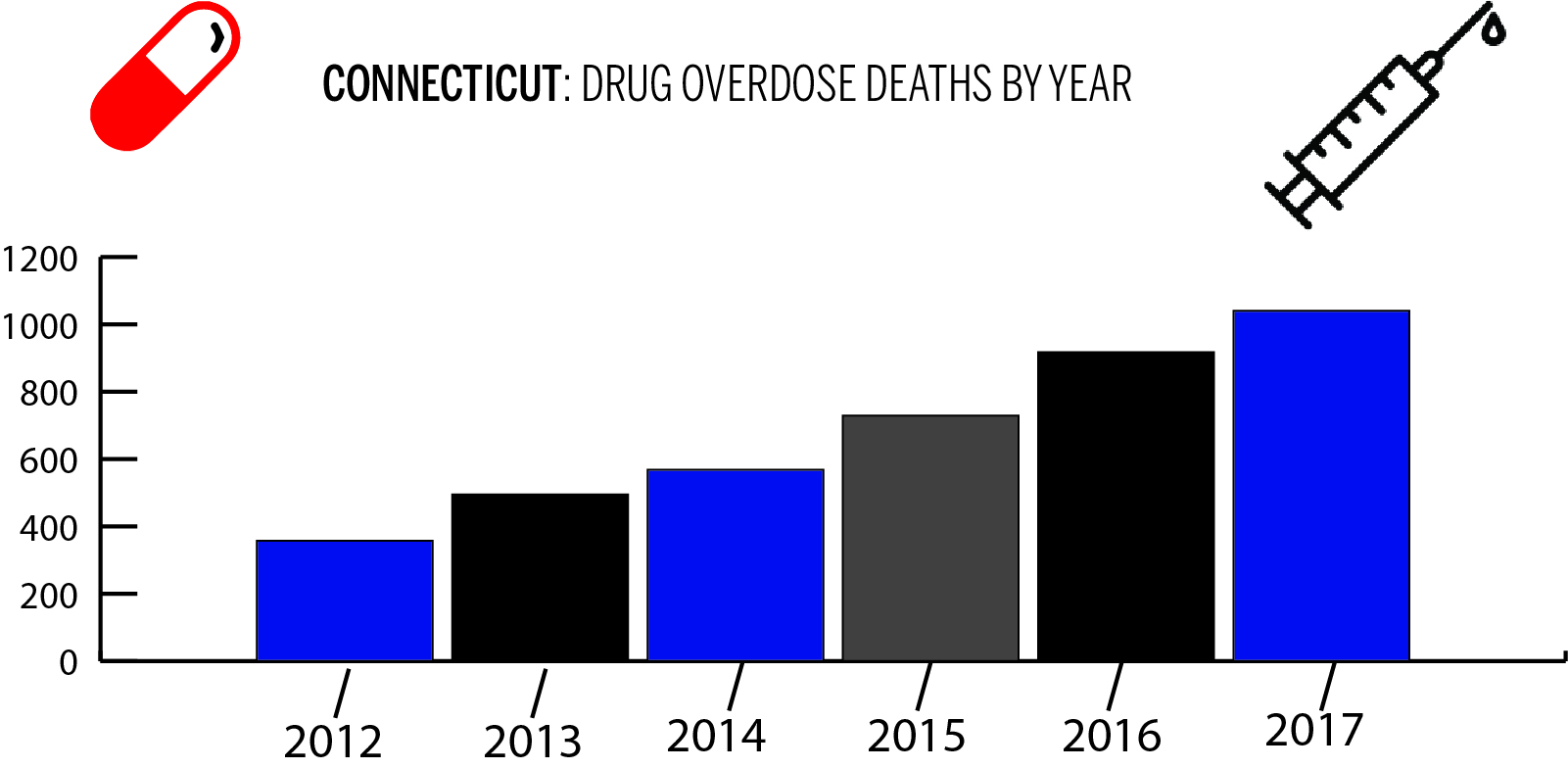
André Costa
In response to the nationwide opioid epidemic, Connecticut is redoubling its efforts to curb the crisis through a new public awareness campaign.
Announced by Gov. Dannel Malloy on Monday, the Change the Script campaign seeks to change the prevailing attitudes toward opioids and to connect local leaders, health care professionals and the general public with resources to cope with addiction through public education and marketing efforts. The campaign is a collaboration between the state Public Health, Consumer Protection and Mental Health and Addiction Services departments and uses funding that the three agencies sought jointly from the federal government. Drug overdoses, mostly from opioids and their substitutes, took more than 1,000 lives in Connecticut last year, a threefold increase from five years ago.
“Let’s be very clear: We have to stop getting people addicted, and we have to have addicted people know that someone is putting poison to them,” Malloy said on Monday, at a press conference announcing the campaign at the Saint Francis Hospital in Hartford. “Fentanyl has caused 700 deaths last year. Seven years ago, it was four — in the whole state of Connecticut. Think about that.”
Nationally, the number of overdose deaths from fentanyl and fentanyl analogues have jumped a whopping 540 percent from 2013 to 2016, emerging as the leading cause of death among overdose deaths, according to the Center for Disease Control.
Malloy said that many people first became addicted to prescription opioids and then turned to cheaper drugs, especially heroin and fentanyl, as substitutes.
Rather than directly funding medical services, the campaign seeks to raise awareness of the risk of opioid addiction and highlight resources and proven methods for treatment and recovery, according to Diana Lejardi, the spokesperson for the Department of Mental Health and Addiction Services. It includes efforts on three distinct fronts: educational toolkits for local governments and health care agencies; a targeted campaign to popularize among prescribers the Connecticut Prescription Monitoring and Reporting System, a web-based tool that tracks the controlled substance use of patients; and a broader educational campaign aimed at the general public.
According to the governor, the campaign’s “Change the Script” captures its overarching objective: to alter the nature of the larger public dialogue around opioid addiction. The campaign seeks to reduce the stigma and shame associated with opioid addiction, which have often discouraged patients from seeking help, and to address the tendency among physicians to overprescribe opioids and the need for proper storage and disposal.
“The campaign is anchored in one consistent message: change the script,” Department of Mental Health and Addiction Services Commissioner Miriam Delphin-Rittmon said at the announcement. “This message was chosen because of its ability to speak to a broad audience and its emphasis on change — changing how we respond, changing what we do, changing the story on the state level and in our communities.”
Pamela Jones Mautte — director of Alliance for Prevention and Wellness, a regional prevention council in Greater New Haven — told the News that her agency will help to disseminate educational materials through a variety of mediums, including billboards, social media and press advertisement brochures. She emphasized the importance of such efforts but said that in the past, these efforts have been funded properly in Connecticut, a problem that this campaign hopes to address.
“With prevention and educational efforts, we are changing knowledge, changing attitudes and changing beliefs,” she said “We know [such efforts] are extremely effective from other major health issues that have happened in the United States over the years.”
The funding for the campaign came from the federal Department of Justice and Department of Health and Human Services, totaling around $250,000 in various grants, according to Lejardi. The campaign reflects the state’s belief in a comprehensive set of prevention, treatment and recovery efforts, she said.
Also on Monday, Sen. Richard Blumenthal LAW ’73, D-Conn., sent a letter to the chairman of the Senate Appropriations Committee calling for new opioid funding for Connecticut, which now disburses over $65 million every year to treat opioid dependency. Blumenthal called the opioid epidemic a “public health tsunami” and emphasized that many treatment centers, rehabilitation facilities and prevention programs are chronically underfunded.
The United States has witnessed skyrocketing death rates in recent years from drug overdoses, which killed more than 64,000 people in 2016, the latest year for which national data was available from the CDC. This number is nearly two times as high as the number of the deaths from firearms or motor vehicle accidents. Connecticut had the 11th-highest overdose death rate in the nation last year, at 27 per 100,000 residents.
At the press conference, Malloy said there were some hopeful signs from the second half of last year, including a decrease in the number of opioid prescriptions. Still, he cautioned that there is still much to do to stop doctors from overprescribing opioids.
“We should stop prescribing opioids to people unless it is our intention to have them become addicted,” Malloy said.
Malcolm Tang | jiawei.tang@yale.edu







